Description
CD137 (mouse)
All names and symbols: Tumor necrosis factor receptor superfamily member 9; TNF receptor superfamily member 9; 4-1BB ligand receptor; T-cell antigen 4-1BB homolog; T-cell antigen ILA; 4-1BB; A930040I11Rik; AA408498; AI325004; CD137; CDw137; ILA; Ly6; Ly63; TNFRSF9
| Host species | Rat |
| Clonality | Recombinant |
| Isotype | IgG2a, kappa, recombinant version of original IgG1 clone LOB12.3 |
| Confirmed species reactivity | Mouse |
| Confirmed applications | FC, CD8+ T cell activation |
| Aeonian Rating® | 85 |
| RRID | AB_2904497 |
Immunoassays
Flow Cytometry (FC):
The original clone LOB12.3 was successfully used on mouse splenocytes.
Taraban VY, Rowley TF, O’Brien L, Chan HT, Haswell LE, Green MH, Tutt AL, Glennie MJ, Al-Shamkhani A. Expression and costimulatory effects of the TNF receptor superfamily members CD134 (OX40) and CD137 (4-1BB), and their role in the generation of anti-tumor immune responses. Eur J Immunol. 2002 Dec;32(12):3617-27. doi: 10.1002/1521-4141(200212)32:12<3617::AID-IMMU3617>3.0.CO;2-M. PMID: 12516549.
Biological Activity
CD8+ T-cell activation:
The original clone LOB12.3 was successfully used to activate CD8+ T cells from mouse splenocytes by binding to the CD137.
Taraban VY, Rowley TF, O’Brien L, Chan HT, Haswell LE, Green MH, Tutt AL, Glennie MJ, Al-Shamkhani A. Expression and costimulatory effects of the TNF receptor superfamily members CD134 (OX40) and CD137 (4-1BB), and their role in the generation of anti-tumor immune responses. Eur J Immunol. 2002 Dec;32(12):3617-27. doi: 10.1002/1521-4141(200212)32:12<3617::AID-IMMU3617>3.0.CO;2-M. PMID: 12516549.
LOB23.3-specific most recent literature
Gaspar M, Pravin J, Rodrigues L, Uhlenbroich S, Everett KL, Wollerton F, Morrow M, Tuna M, Brewis N. CD137/OX40 Bispecific Antibody Induces Potent Antitumor Activity that Is Dependent on Target Coengagement. Cancer Immunol Res. 2020 Jun;8(6):781-793. doi: 10.1158/2326-6066.CIR-19-0798. PMID: 32273279.
Lakins MA, Koers A, Giambalvo R, Munoz-Olaya J, Hughes R, Goodman E, Marshall S, Wollerton F, Batey S, Gliddon D, Tuna M, Brewis N. FS222, a CD137/PD-L1 Tetravalent Bispecific Antibody, Exhibits Low Toxicity and Antitumor Activity in Colorectal Cancer Models. Clin Cancer Res. 2020 Aug 1;26(15):4154-4167. doi: 10.1158/1078-0432.CCR-19-2958. Epub 2020 Apr 28. PMID: 32345647.
Webb ER, Lanati S, Wareham C, Easton A, Dunn SN, Inzhelevskaya T, Sadler FM, James S, Ashton-Key M, Cragg MS, Beers SA, Gray JC. Immune characterization of pre-clinical murine models of neuroblastoma. Sci Rep. 2020 Oct 7;10(1):16695. doi: 10.1038/s41598-020-73695-9. PMID: 33028899.
Innamarato P, Asby S, Morse J, Mackay A, Hall M, Kidd S, Nagle L, Sarnaik AA, Pilon-Thomas S. Intratumoral Activation of 41BB Costimulatory Signals Enhances CD8 T Cell Expansion and Modulates Tumor-Infiltrating Myeloid Cells. J Immunol. 2020 Nov 15;205(10):2893-2904. doi: 10.4049/jimmunol.2000759. PMID: 33020146.
Song E, Mao T, Dong H, Boisserand LSB, Antila S, Bosenberg M, Alitalo K, Thomas JL, Iwasaki A. VEGF-C-driven lymphatic drainage enables immunosurveillance of brain tumours. Nature. 2020 Jan;577(7792):689-694. doi: 10.1038/s41586-019-1912-x. Epub 2020 Jan 15. Erratum in: Nature. 2021 Feb;590(7845):E34. PMID: 31942068.
Kim B, Sun R, Oh W, Kim AMJ, Schwarz JR, Lim SO. Saccharide analog, 2-deoxy-d-glucose enhances 4-1BB-mediated antitumor immunity via PD-L1 deglycosylation. Mol Carcinog. 2020 Jul;59(7):691-700. doi: 10.1002/mc.23170. Epub 2020 Mar 1. PMID: 32115801.
Salazar-Degracia A, Granado-Martínez P, Millán-Sánchez A, Tang J, Pons-Carreto A, Barreiro E. Reduced lung cancer burden by selective immunomodulators elicits improvements in muscle proteolysis and strength in cachectic mice. J Cell Physiol. 2019 Aug;234(10):18041-18052. doi: 10.1002/jcp.28437. PMID: 30851071.
Qi X, Li F, Wu Y, Cheng C, Han P, Wang J, Yang X. Optimization of 4-1BB antibody for cancer immunotherapy by balancing agonistic strength with FcγR affinity. Nat Commun. 2019 May 20;10(1):2141. doi: 10.1038/s41467-019-10088-1. PMID: 31105267.
| Expiration | Integrity warranted for 24 months after purchase when handled and stored according to instructions, see below. |
| Storage instructions | Avoid repeated freeze/thaw cycles. For long term storage, keep small aliquots at -20°C or -80°C and keep one aliquot at 4°C for daily experimentations. Azide will preserve antibody at 4°C for 6-12 months, when kept away from direct sun light. |
| Warranty | This product is only warranted for the specifications as described in this product sheet and only when the product is handled and stored according to instructions. User should validate this antibody in the application and tissue/cell type as required, after confirmation of integrity upon receipt is obtained by reproducing the performance as described below. Should such confirmation not be attempted, any warranty is void. In case of non-conformance, user needs to contact us immediately for replacement or refund. |
| Liability | This product is for in vitro research use only. Any other applications, such as diagnostics or therapeutics, or in vivo experiments, and the validation of this product therein, are solely at the responsibility of the buyer/user. |


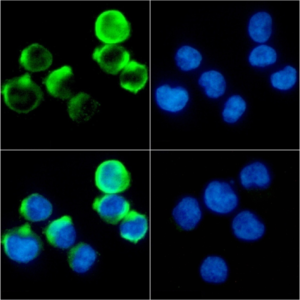
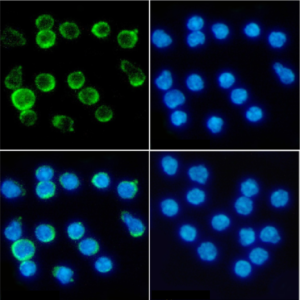

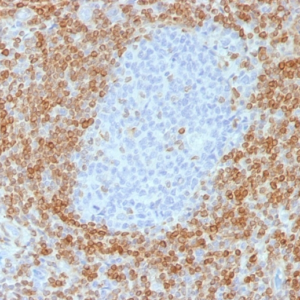
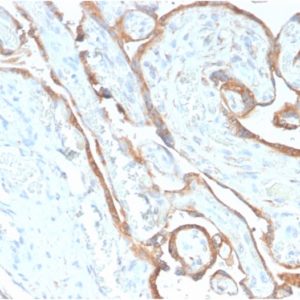
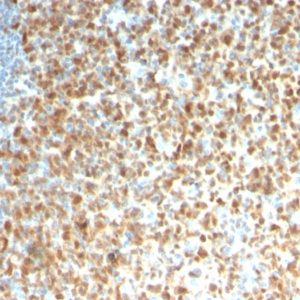
Reviews
There are no reviews yet.